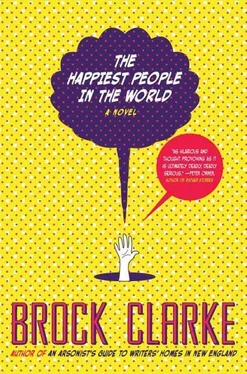“Goal?” he said.
“I believe so,” his father said.
“I don’t know how you can watch this stuff.”
His father shrugged. “It’s better than making nets.” This was the way Søren’s father talked. Something was always better than something else. When his wife, Søren’s mother, had died several years earlier of breast cancer, he’d gone back to work making nets the day after, and when someone had asked him how he could go back to work making nets so soon after his wife’s death, he had shrugged and said, “It’s better than sitting at home.”
“Can I borrow the car tomorrow morning?” Søren asked. And then he added, “Don’t look at me like that.”
“Look at you like what?” Søren’s father said, still looking at him like that. His father’s look: it had always been there. But it had gotten more intense, more squirm inducing, more knowing, since Søren had accidentally murdered the cartoonist. Or was that just Søren’s imagination? In any case, Søren didn’t know how much longer he could take it, the look, the look, the look that was made up of a litany of don’ts: don’t disappoint me, don’t make me look bad, don’t make your people look bad, don’t you know we moved to this country so you could be your own person, don’t be someone else’s person, don’t forget that you’re my son, don’t do anything stupid, don’t hurt the car, don’t hurt yourself, don’t you know that your mother told me before she died not to let anything happen to you, don’t you know I’d die if something happened to you, don’t make me die, don’t kill me, don’t kill yourself, don’t kill anyone else, don’t get caught if you do, don’t do anything terrible, don’t you know that I love you no matter what terrible thing you’ve done, don’t forget that, don’t do it again, don’t make it worse, don’t you know I know everything about you, don’t cry, for crying out loud, don’t cry because then I’ll cry, just don’t, don’t, do not .
“Just don’t forget to put gas in the car,” Søren’s father said, and he turned back to his handball.
Isn’t it Saturday?” the imam said. Søren was looking into the tiny eye at the top of his computer but was also looking at the screen itself. On it was a man his father’s age with a long gray-black beard grown high on his cheeks, wearing thick-framed glasses with slightly tinted lenses and a white turban and white robes. At least Søren assumed they were robes: Søren had only ever seen the imam from the shoulders up. “Isn’t it a Saturday night?” the imam asked.
“Please, I know,” Søren said. There were no mosques in Skagen; there were no Muslim prayer groups in Skagen, either; there were no Muslims in town at all except for Søren and Tarik and their families. Before Søren had killed the cartoonist, he had not been religious; he had not felt religious; he had not felt the need to feel religious. But ever since then, ever since he had committed a crime that everyone seemed to think was a crime that could only be committed by a religious zealot, Søren had felt the need to feel something else, something greater that might keep him from feeling something worse than what he already felt. So he went online. The problem with going online was that the kind of people who wanted to give advice online tended to be people who were big advocates of things like burning and killing, and Søren had already done that. But finally, a few months earlier, Søren had received what seemed like a mass e-mail from this imam, a Turkish Dane from Copenhagen who claimed to be all the things Søren wanted — he was wise, he was gentle, he was measured, he was compassionate, he had a reliable Internet connection and the ability to skype — and it turned out he was all those things, although he could also be a bit of a nag when it came to the subject of how Søren spent his Saturday nights.
“It’s a Saturday night,” the imam said. “You should be out with your friends.”
It is not Saturday night in my heart, Søren thought but did not say, because the imam tended to get very impatient with Søren when he said this kind of thing. “I don’t really have any friends,” Søren said.
“What about. .,” the imam said, searching for the name of the friend Søren had mentioned before.
“Tarik,” Søren said.
“Yes,” the imam said. “Him.”
“He’s probably out with his friends.”
“Is there a reason his friends can’t be yours?”
Søren thought about this. He’d been out with Tarik and his friends on previous Saturday nights. Tarik’s friends were all white Danes — people with whom he and Søren had gone to school, people with whom they worked down at the boatyard, random people from around Skagen, friends of friends. They often gathered at Tarik’s apartment before they went out and did whatever. After work, Tarik would tell him, “Go home, shower, then come to my apartment. It’ll be fun. Don’t be such a mope.” Søren would go home, shower, walk to Tarik’s apartment. And then he would be such a mope. He couldn’t seem to help himself. Every time Søren caught himself having even a little bit of fun, he would think, But I’m a murderer. Whenever one of Tarik’s friends seemed to be looking at him even a little bit funny, Søren would think, I bet you think I killed that cartoonist. And then he would add, And you’re right: I did. “You’re such a mope,” Tarik would say. “What’s your problem?” But Tarik knew his problem.
“Yes,” Søren said. “There’s a reason.”
“Is it a good reason?”
Søren shrugged. He’d never come close to telling his father what he had done, but several times over the past month Søren had come close to telling the imam. The urge is great among those guilty of serious crimes to confess to relative strangers who nevertheless seem, in some obscure way, trustworthy. But Søren never could quite do it. The imam might be affected by the confession, but he hadn’t been directly affected by the thing to which Søren wanted to confess. He would confess to the imam, and still he would feel the need to confess to the cartoonist’s widow. Søren shrugged again. “They just don’t seem like my kind of people,” he said. The imam just stared into the screen, waiting, and so Søren added, “I don’t think they like me very much.”
“And why is that?” the imam asked. When Søren shrugged again, the imam said, “Sometimes, in order to understand our enemies we must put ourselves in their place; we must try to see ourselves from their point of view.”
“Is that from the Koran?” Søren asked. The imam had seemed shocked that Søren had never read the Koran, not once in his twenty-two years. So he made Søren buy a copy, suggested he read a page or so a night. Søren had done that. Perhaps it was wrong to say, about reading a holy book, that you were kind of enjoying it, but Søren was kind of enjoying it, although it also had the effect of making much of what the imam said seem like he might be quoting from the Koran.
The imam smiled. “No, that’s all mine,” he said. And then: “What about your father? What’s he doing tonight?”
“He went out for a walk.” This was true, although it was also true that Søren had no idea where his father went when we went for his Saturday night walks. After dinner on Saturday, Søren’s father often went out for walks and then didn’t come back until an hour or two later. Søren suspected that his father had a girlfriend, a suspicion that made him feel happy and also made him feel like the loneliest person in the world.
“Poor Søren,” the imam said. “Everybody is out doing something. Everybody but you.”
This was the kind of tough love the imam practiced when pushed. He could be kind, and gentle, and patient, but he also liked to mock Søren when those things didn’t seem to be working. Usually Søren just shrugged and took it, because he didn’t want the imam to give up on him. But not tonight. Tomorrow Søren was going to confess to the cartoonist’s widow, and everything was probably going to change then anyway. So why not start changing things tonight? “Not everybody,” Søren said. “It’s a Saturday night for you, too. You’re just as pathetic as I am.”
Читать дальше












